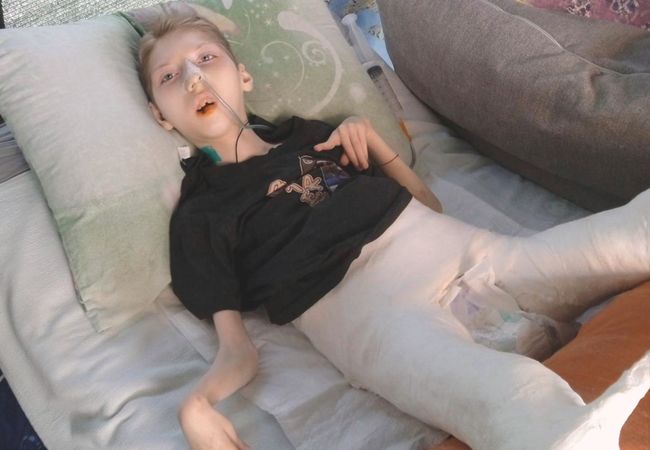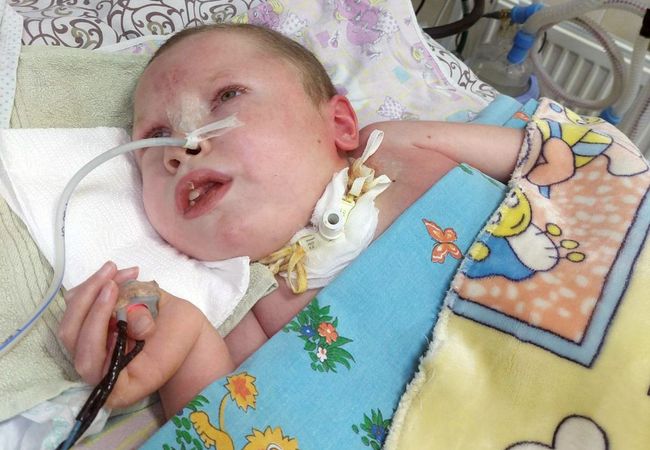It was the pearl of the Black sea, the city where Eisenstein rolled the scene of the staircase of the 'Battleship Potemkin'. Today, the Ukrainian town [receives] in its streets thousands of lost and forgotten children, hundreds of them hooked on glue and 'baltushka'.
Ivan Kuvshinov is 14 years old. Desperate and with a syringe in the hand, he looks for a decent vein in the swollen legs of Miroslav Tolpiza, two years older than he. He's knocking on the skin but nothing there. Miroslav is impatient and ends up by screaming to his friend: " Find the damned vein, quit wasting time!"
Ivan does not find it and Miroslav becomes an [energъmeno ?], spinning around on an old carpet. He covers himself in an old blanket and starts coughing up blood. On the other side of the room there is Konstantin Golubenko sitting on the floow, in his own feces and garbage that stinks. 17-year-old Konstantin, grits his teeth in pain. The dose brings in good and a cigarette is lit. Kuvshinov helps his companions to get the daily dose. He holds Denis's arm, the Moldavo, and he punctures him next to the armpit. Denis is 12 years old and came to Odesa from the Moldavian frontier. Not of to cough. These are only a handful of adolescents of the 3.000 who stroll the streets of the port Odesa. This estimate is provided by Sergei Kostin, president of The Way Home, an NGO entrusted to help these boys. The newspapers of Kiev have spread a study of the Committee of the State for the Family and the Children, dated 2001, which estimated 300.000 of the young children without homes in the whole Ukraine. "They live in cellars, in portals, in attics and godforsaken buildings. They do not have papers, any access to medical, social or educational help", says Natalia Vegriyan, social worker.
Since the collapse of the Soviet Union, the social networks of support have disintegrated this marginal population. And the situation [convulsed with Ukraine] does not help. The majority come from families of alcoholic or drug addicts; but also there are orphans, boys who neither have any expectation and have not even lived through a normal family life. It is on the verge of dawn. A young man walks on the toes of the feet; so much baltushka has been injected into his heels that he now has ruined nerves. After seizing a bottle of plastic loaded with glue, the delicacy that keeps them stunned for the whole day, he falls down roundly on an anthill of needles.
The baltushka uses efedrina as its base, a psyco-stimulant that they extract from capsules of medicine. Bargain sale of doing. Sometimes the cocktail includes also cocaine or morphine. The children are being injected by needles that they share, in an environment that gives dread. The doctor Anatoly Ptashnik, in charge of the most important hospital for the treatment of HIV in Odesa, is very clear: " Red phosphorus, vinegar, all kinds of bacteria, flu or tuberculosis virus; the periodic table of the elements is found in these syringes, where the liquid runs directly to the blood, including the viruses." According to United Nations, Ukraine is on the verge of suffering an epidemic [of been]. In the last five years the number of infections has multiplied by twenty, being thought that more than 1 per cent of the population, approximately 400.000 persons, has the HIV. Of those, 75 per cent are as a consequence of drugs being injected with dirty needles.
Two thirds of the children of the street are HIV positive. Between alcohol, glue and the baltushka, the underworld of Odesa keeps on growing. Tourism also has provoked some children to take up prostitution.
Next to a McDonald's, between two blocks of apartments, a group of glue sniffers lives in the sewers. They try to conceal their bottles. Slavik Berestov is a 11-year-old fair-haired boy who does not stop smiling. It is [flipando] with the glue: " Everything changes before your eyes, an elephant looks at me, throws water at me". The hallucinations do not prevent him from giving himself almost eight daily doses. His godfather Sergei Kushnir boasts that he needs 30 bottles [to hallucinate].
Kostin was one of these junkies and earlier was addicted to alcohol. He founded a home for these lads. It can admit up to one hundred children, offers clean rooms, psychological consultation, summer camps, programs of rehabilitation, job preparation, legal protection... Not only do they work with children, they help the hooked adults so that the children of these adults do not fall down the same wrong path. Lena, a 13-year-old girl, has been in the center one year and it seems that her sense of responsibility has improved. "Every day I worry less about her because I know that as more time goes by, it is less likely that she will relapse", says Kostin, but there are few children like Lena.
The center that The Way Home possesses in Odesa took in Golubenko and his friend Taras, not long ago. They arrived loaded with louses, gory and very low on defenses, destroyed by the drugs. They seemed happy when they bathed, they ate and dressed themselves in clean cloths. A few days passed and the street was their refuge again. They walk towards the everlasting block, enter the everlasting cellar, where the needles are always spilt like. The door closes after them. They are again where they have always been.



